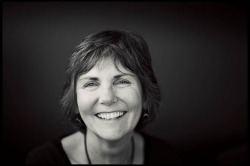Fertile ground for food research

Dr. Lynne Phillips thinks a lot about food.
The Dean of Arts is the chair of FARM (Food Advocacy Research at Memorial), a pan-university working group looking at the various dimensions of food studies. These include food production, food security, retail and marketing, consumer issues, food policy, food chains, food trade, community gardens, nutrition and health, municipal/institutional procurement, food banks, food safety, foodways, cuisine, food history, transportation and waste management.
Before arriving at Memorial in 2013, Dr. Phillips started FAWG (Food Advocacy Working Group) at the University of Windsor, which was comprised of students, faculty and community members in order to develop a food charter for Windsor Essex County.
“That experience showed me how food issues can bring together all sorts of people who otherwise don't connect,” said Dr. Phillips. “It also got me interested in doing research on food issues in Canada (previously I had been working in the Latin American context).”
Once at Memorial she was approached by the campus food group interested in connecting grad students to faculty around food-related research. A general call was put out for faculty interested in the topic and FARM was born.
“FARM has been a great space not only for connecting students and faculty (in addition to a few key members of the community), but for brainstorming ideas for research support and community engagement,” said Dr. Phillips. “Last fall we held a public roundtable on food issues, inviting two chefs, two farmers and a student doing research on fish as food. It was really well attended and helped us identify the barriers to accessing local food from different perspectives.”
Her own interest in food related research stems from observing how regional food systems can be improved through local food production.
“In Windsor there were vast fields of fertile soil entirely dedicated to growing animal food for export. In Newfoundland and Labrador, most of the population depends on food shipped in from elsewhere. In both cases, food security can quickly reach crisis levels when the trucks stop rolling or the ships stop arriving, for whatever reason. As a researcher and anthropologist, I've turned to history to try to understand how we got to this point of dependency. I've found the history of agriculture in Newfoundland and Labrador to be incredibly interesting, inextricably bound up as it is with fishing and gender and power. I'm currently looking at the changing role of the kitchen garden in pre- and post-Confederation Newfoundland.”
In order to get a sense of what is already known about Newfoundland and Labrador’s food system and what still needs to be discovered, graduate student and FARM member Emily Doyle was hired to create what Dr. Phillips calls “a living” bibliography, one that is designed to expand as more research on food is undertaken.
By its very nature food is an interdisciplinary topic. As the mandate of FARM is the whole food system, knowledge from many different angles - medical, cultural, economic, political, geographical and agricultural – is needed.
“What we have in common is the desire to have a healthy, accessible, fresh and sustainable food system in Newfoundland and Labrador,” said Dr. Phillips.
At a recent symposium convened by FARM in May, faculty researchers and graduate students from Grenfell Campus, the faculties of medicine and arts, Memorial’s Botanical Gardens and the Labrador Institute all came together for a day to discuss Newfoundland and Labrador Food Futures.
Next steps for FARM?
Grenfell Campus economist Dr. Catherine Keske will serve as editor of a volume dedicated to the research of FARM members and the group plans to begin investigating the possibilities of a food studies curriculum. Plans are also afoot to incorporate FARM into a research network with the latest iteration of Yaffle.
Faculty members and students interested in food-related issues are encouraged to join FARM. Please visit the website and/or contact arts@mun.ca for more information.